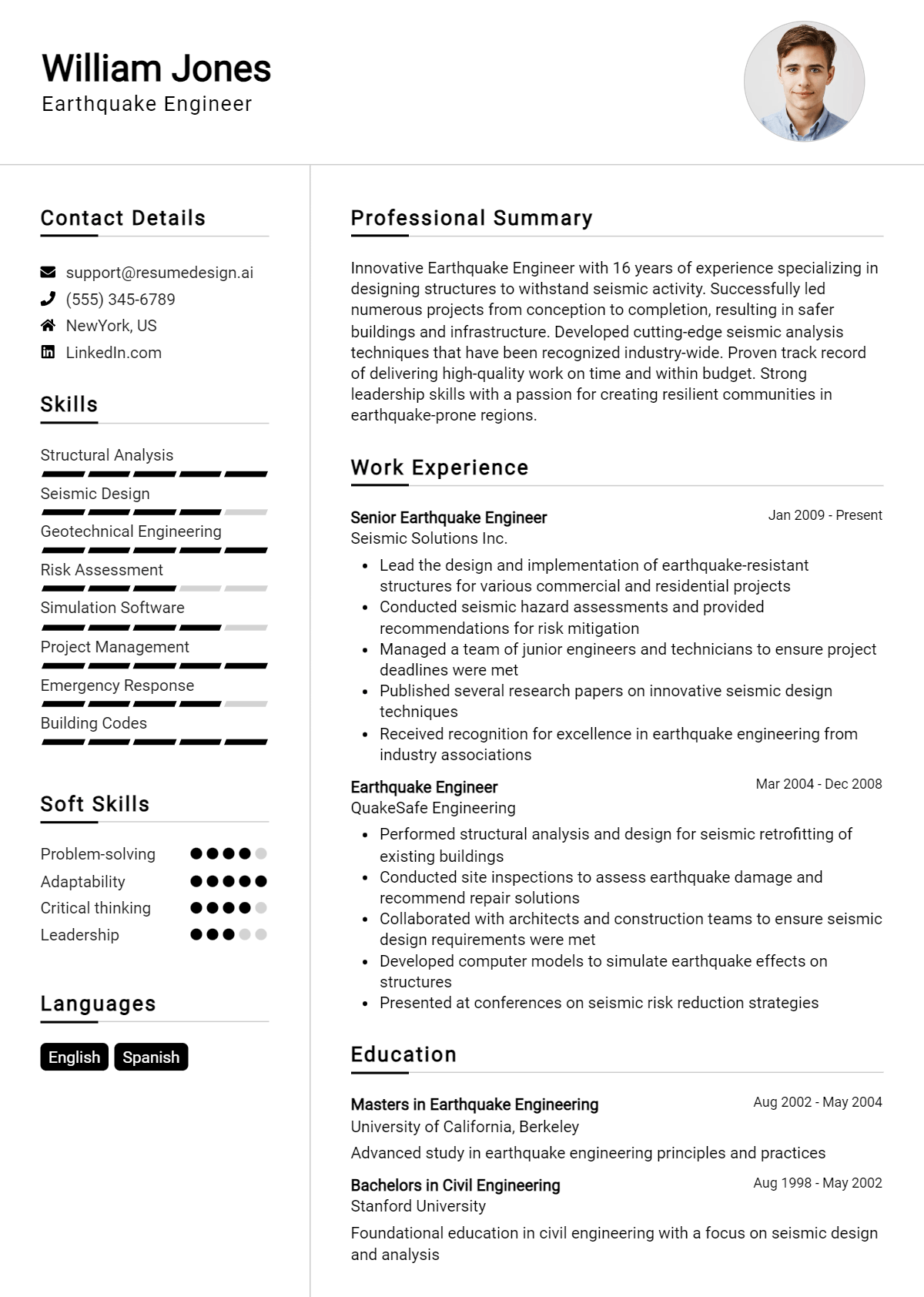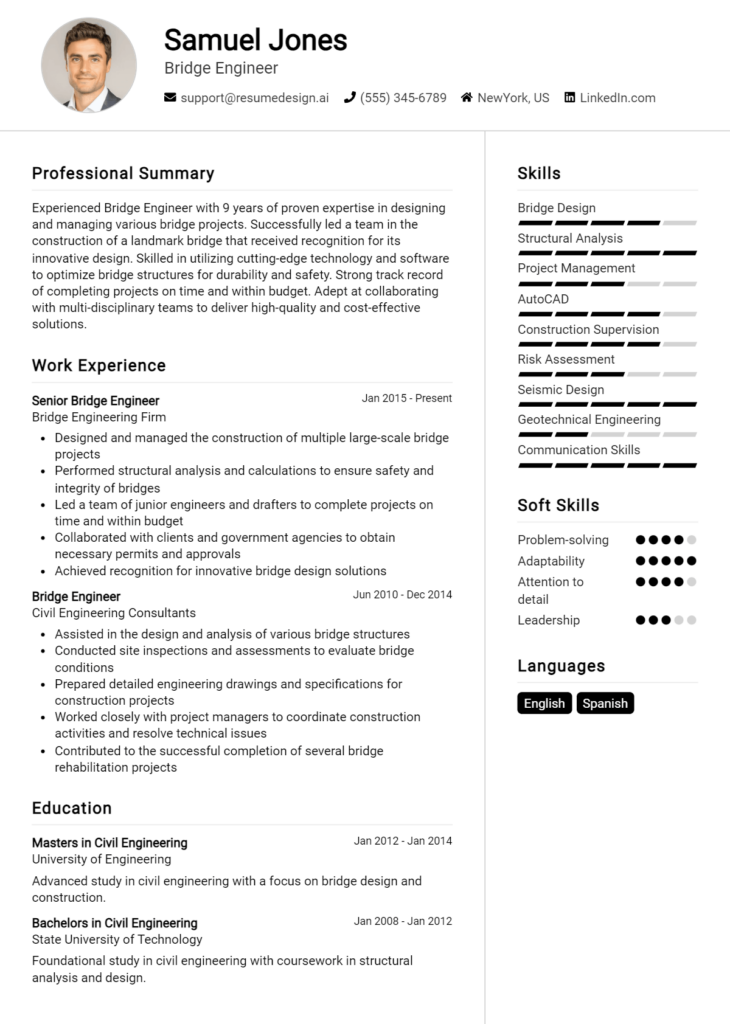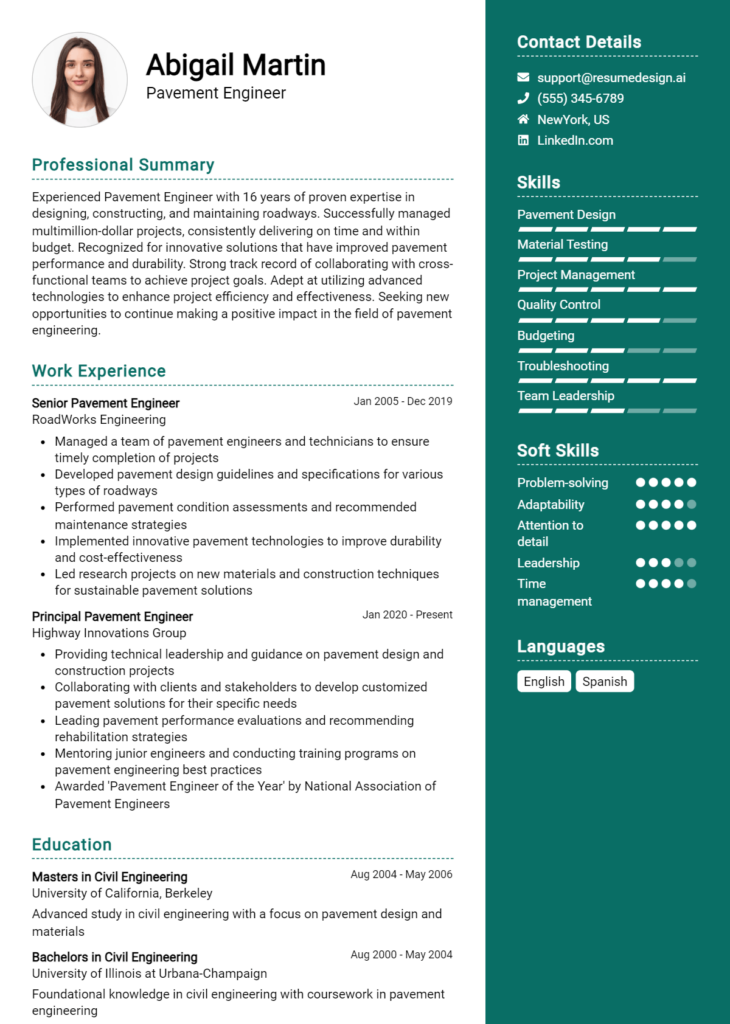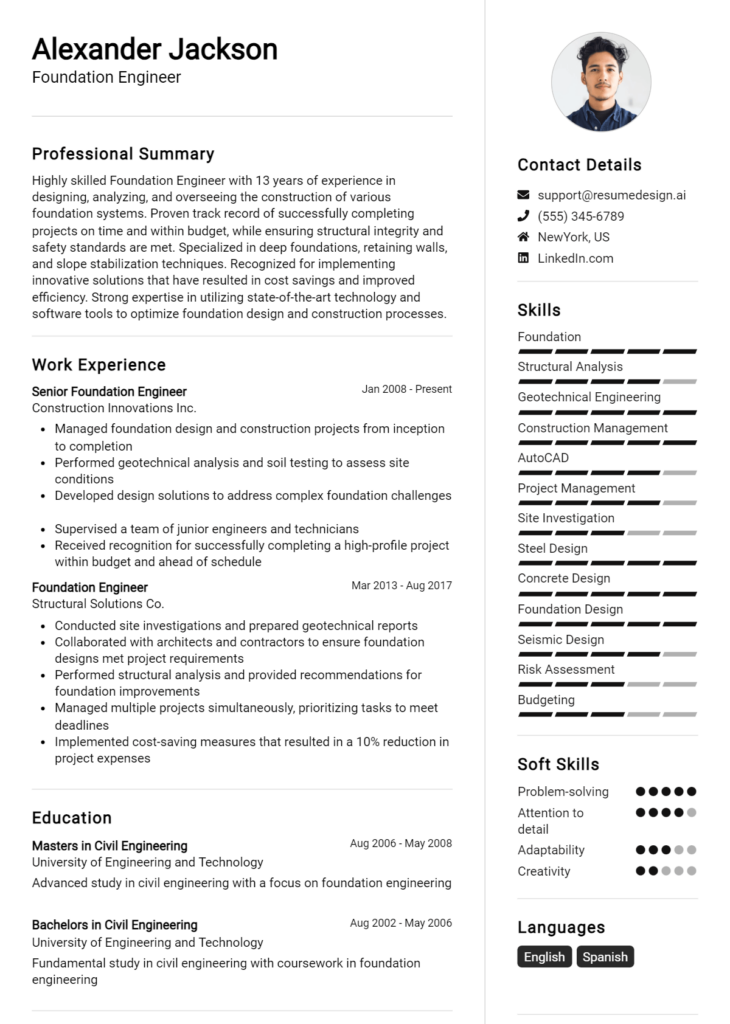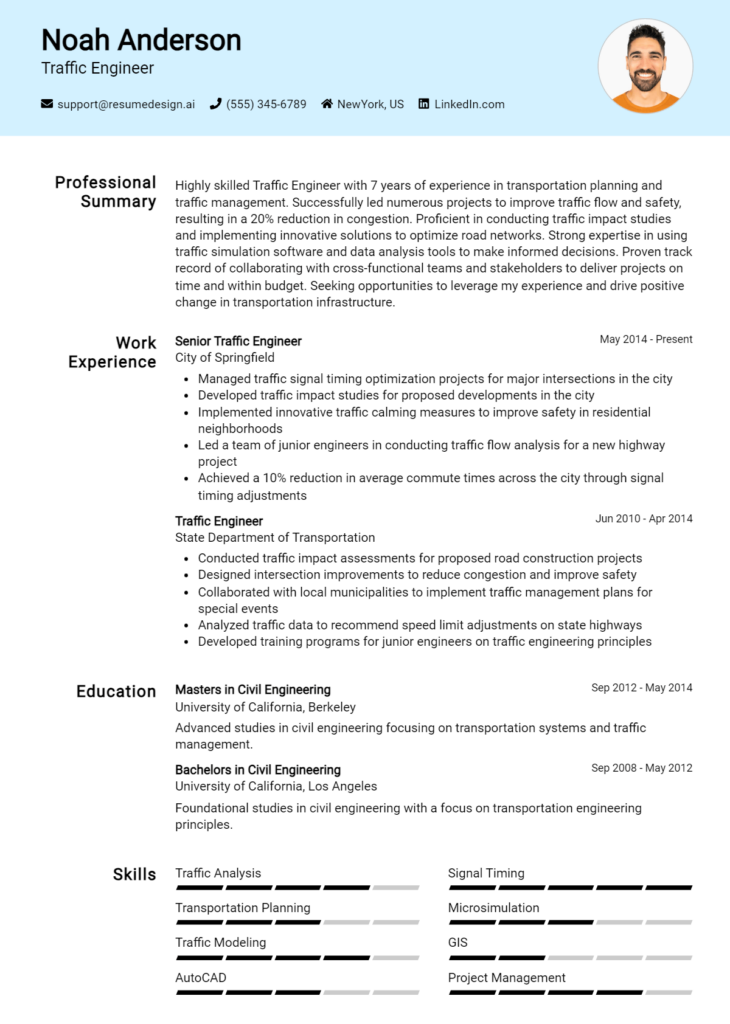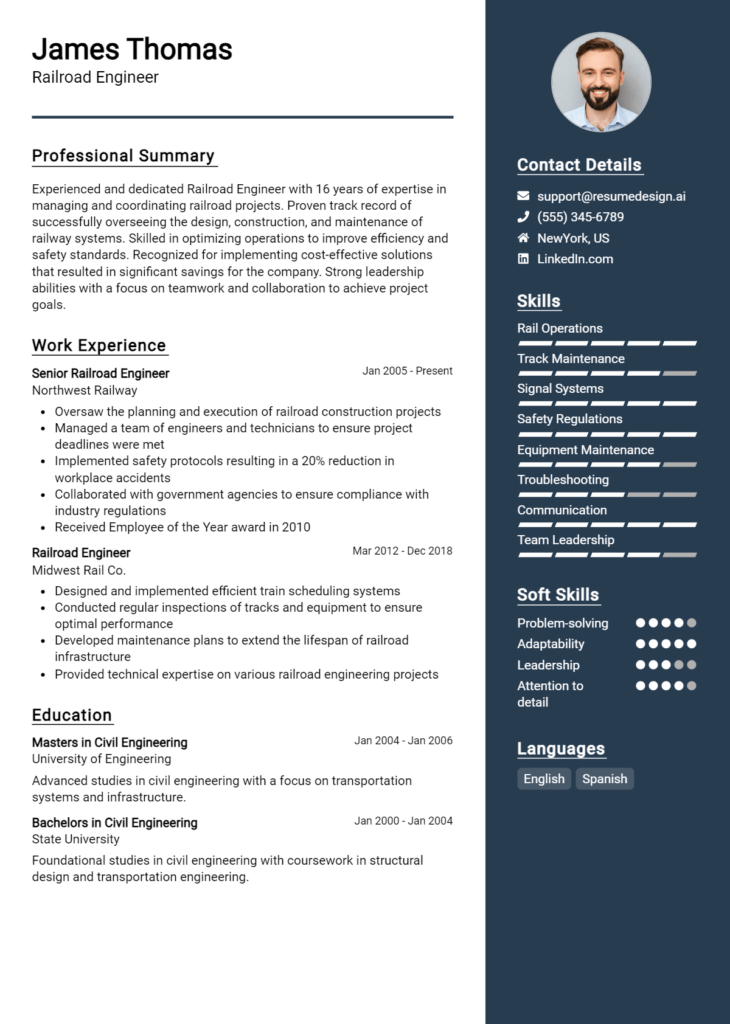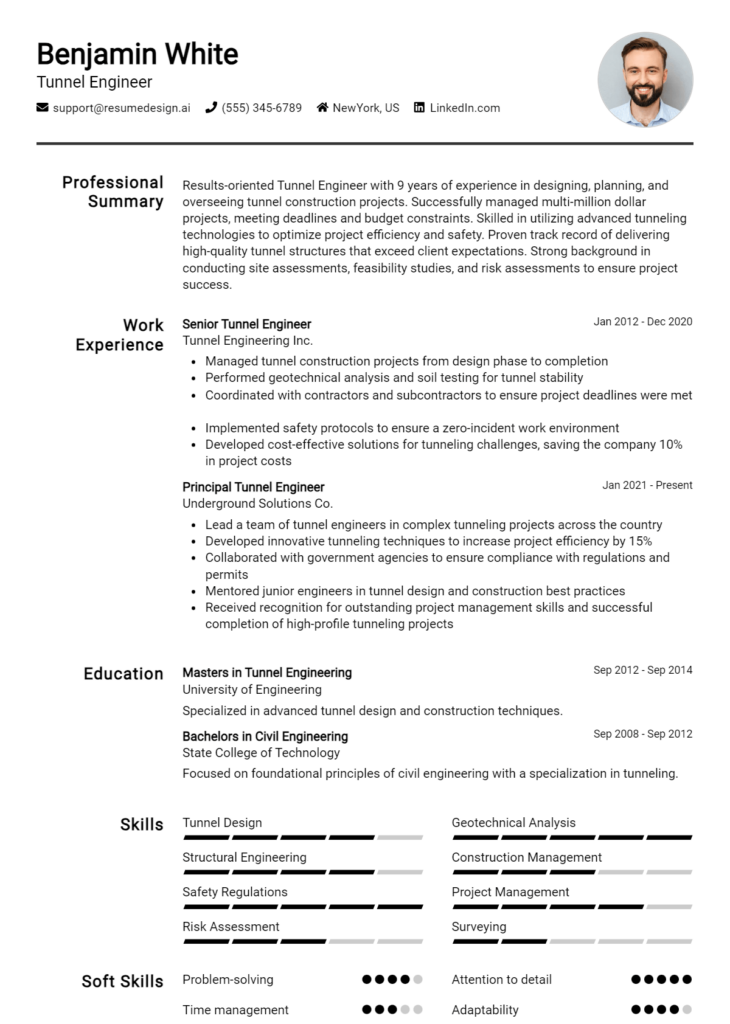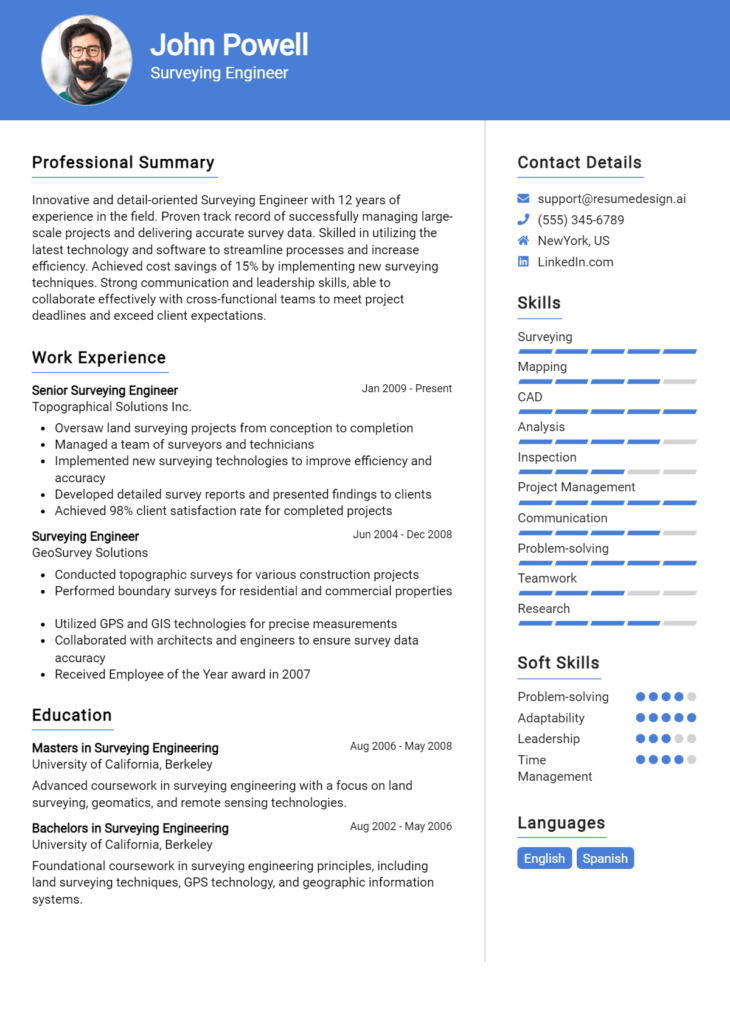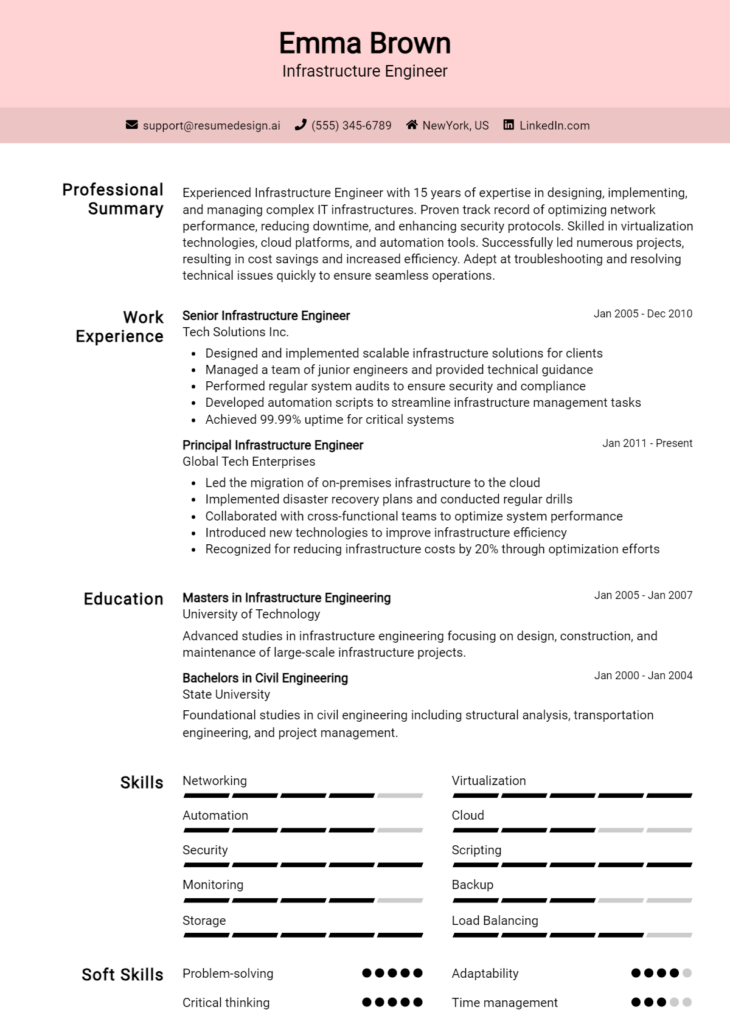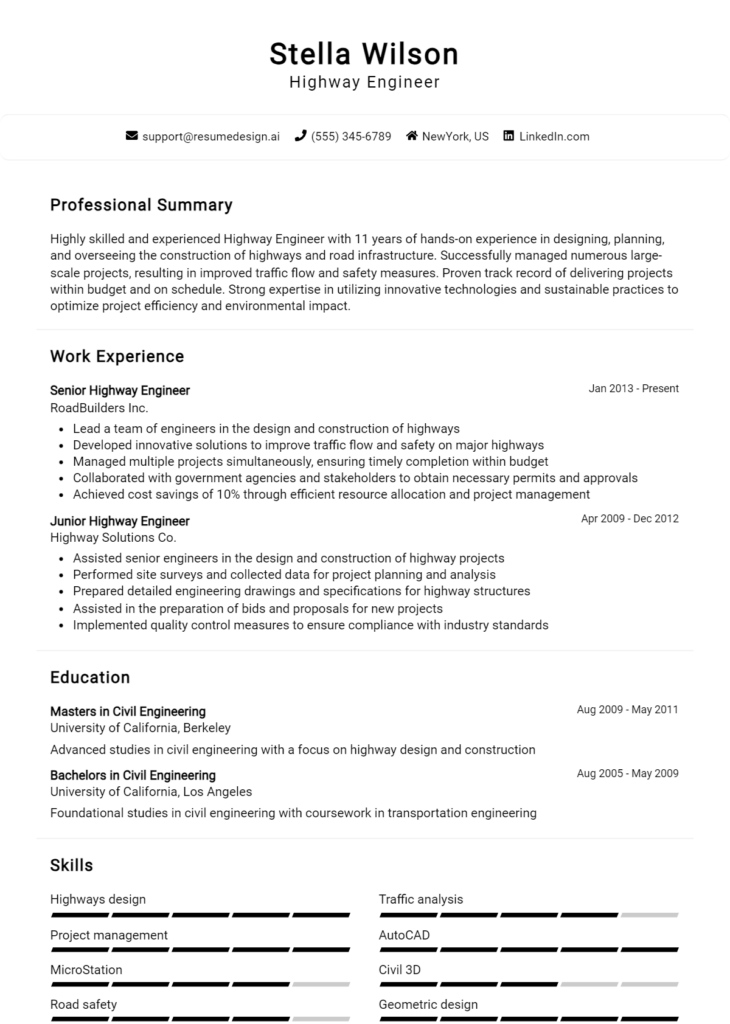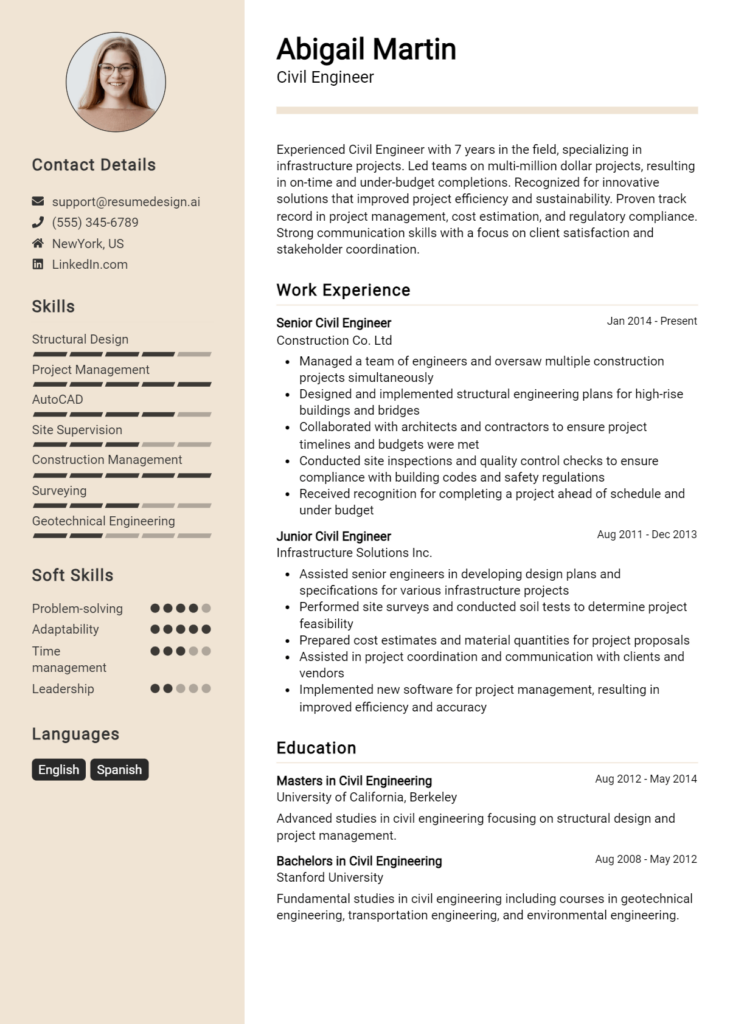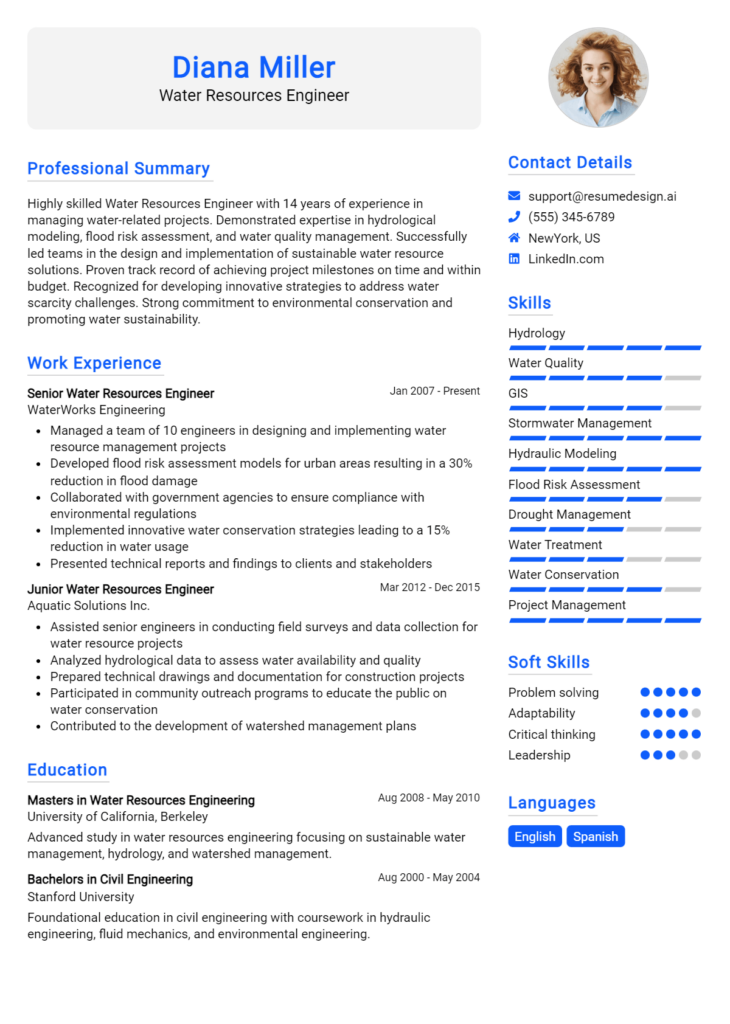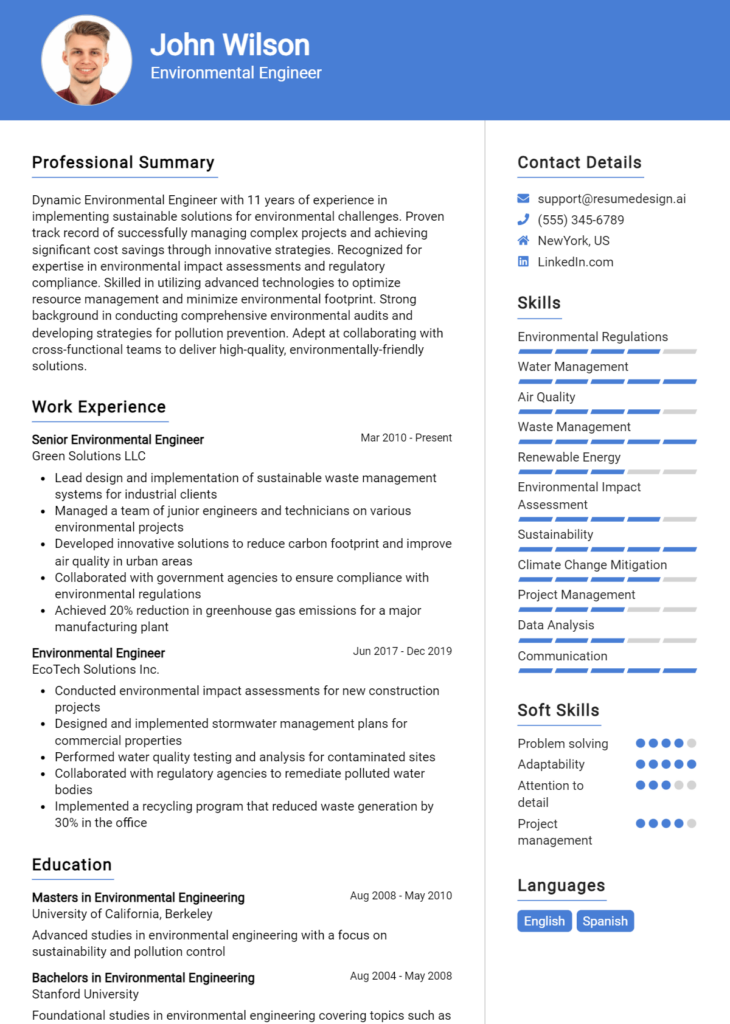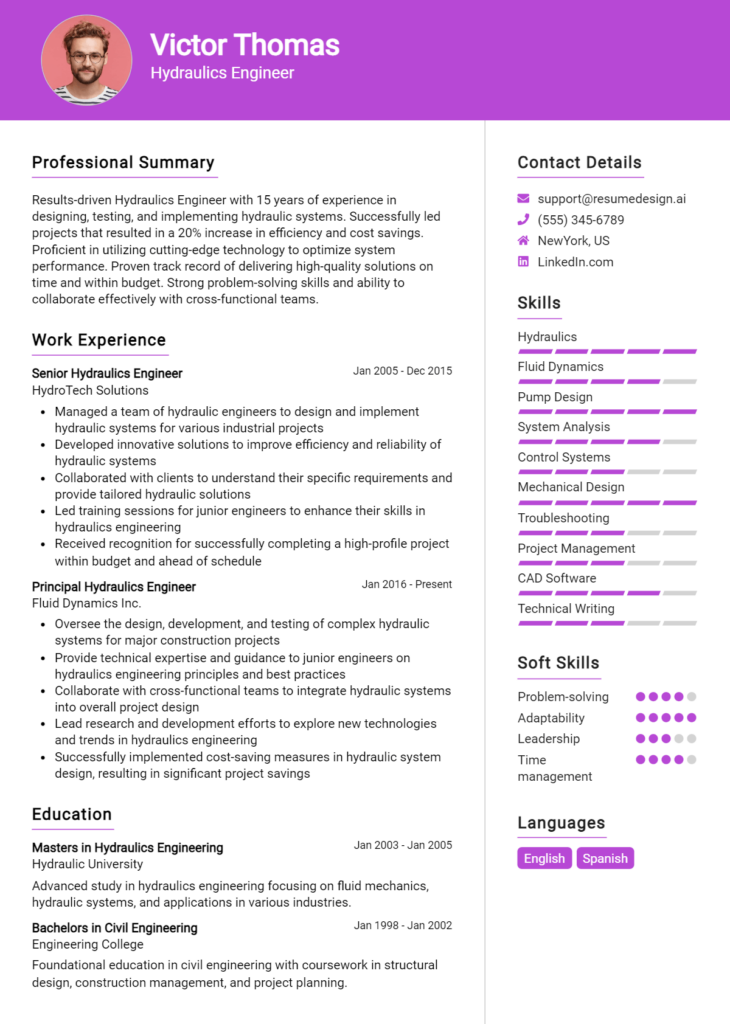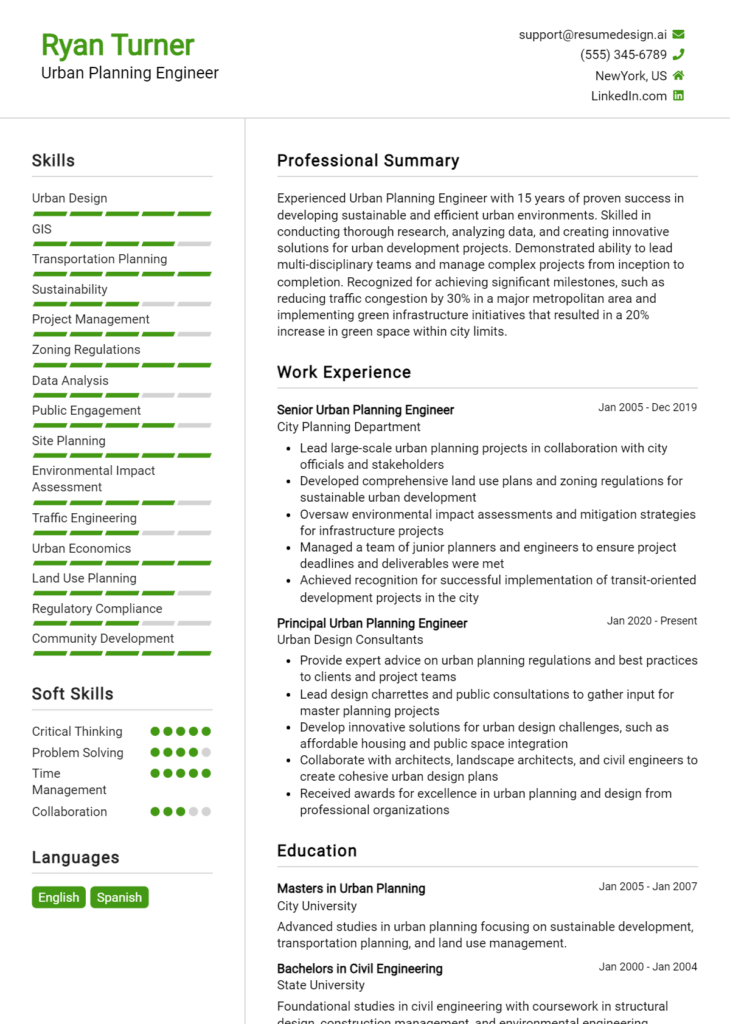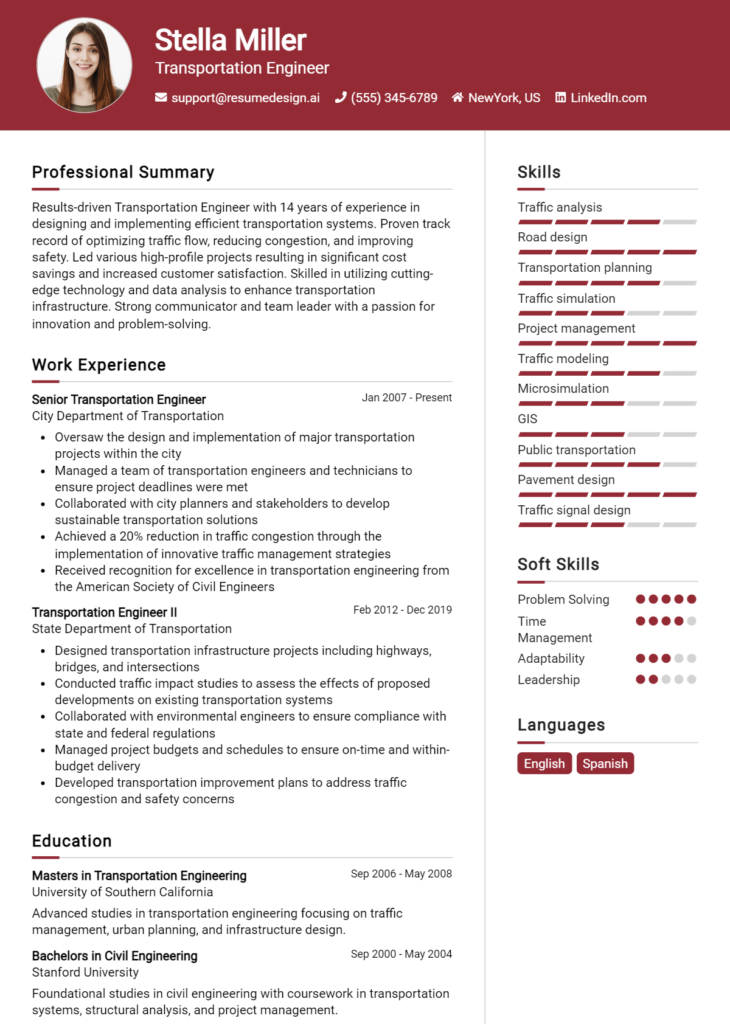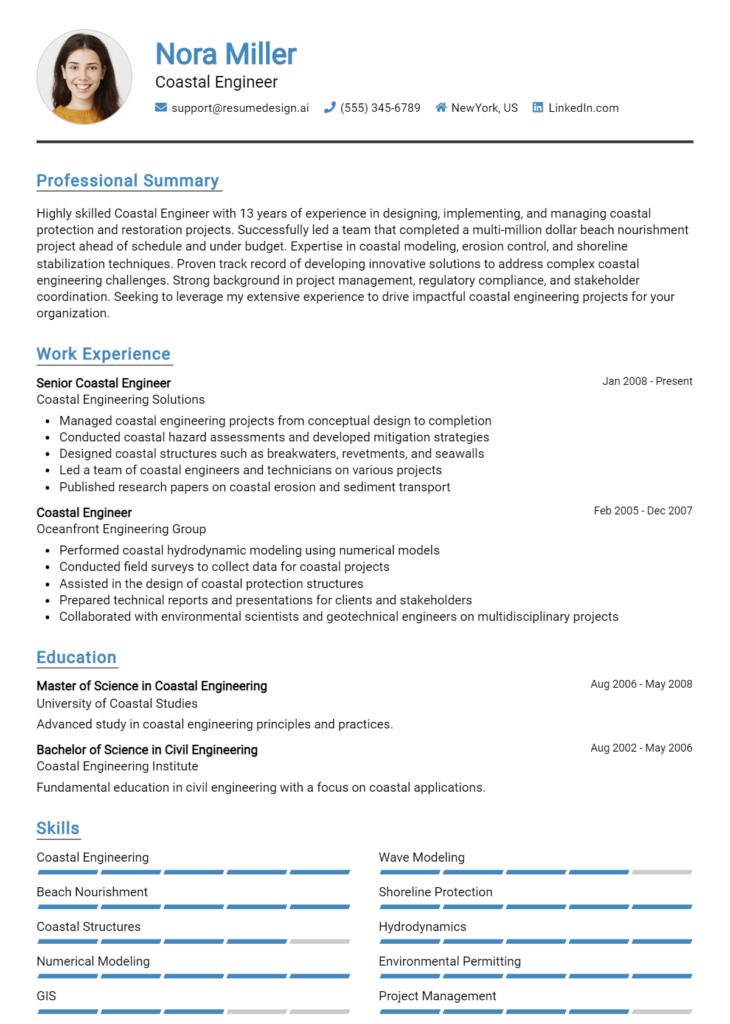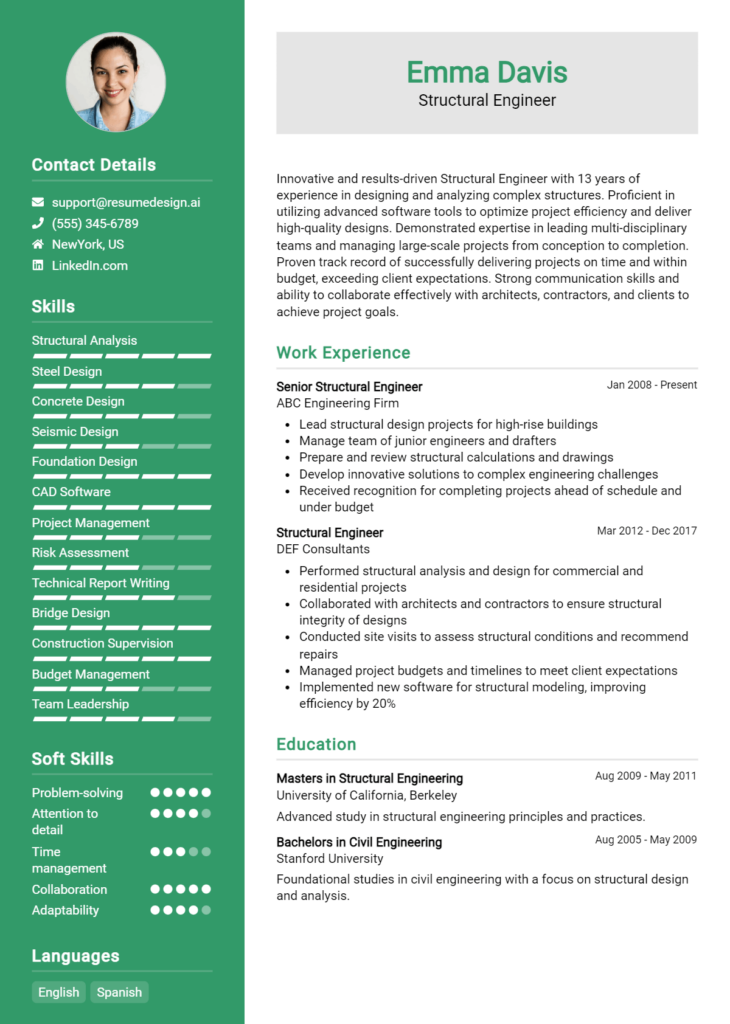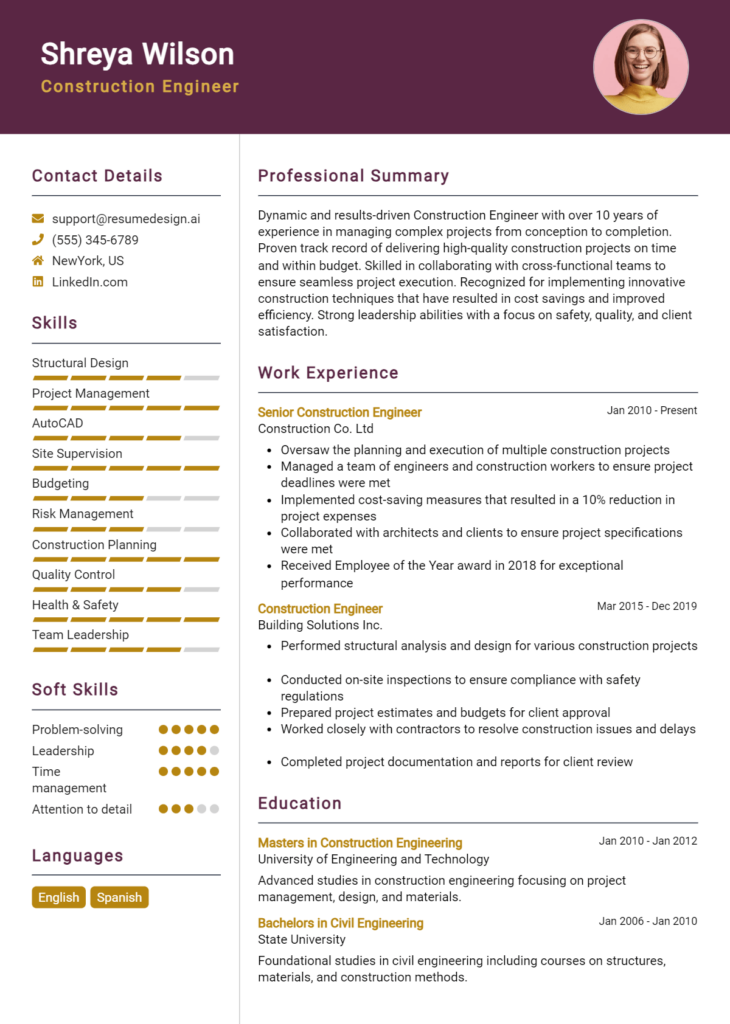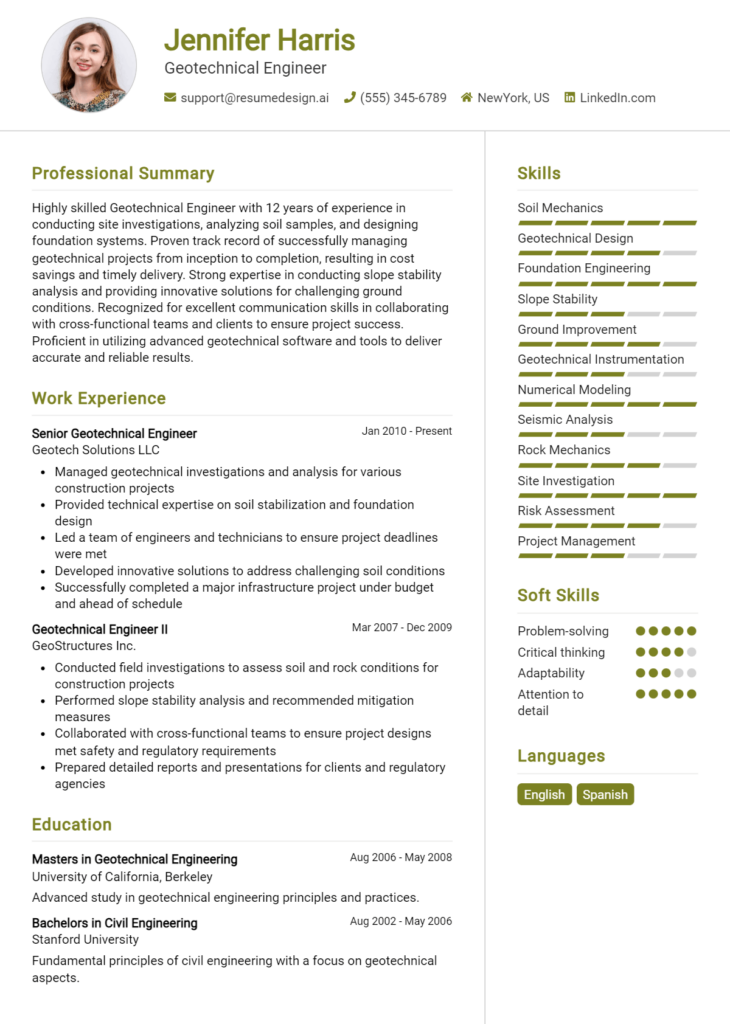Earthquake Engineer Core Responsibilities
Earthquake Engineers are crucial in ensuring the safety and resilience of structures in seismic zones. Their core responsibilities include conducting risk assessments, designing earthquake-resistant structures, and collaborating with architects, construction teams, and government agencies. Essential skills encompass technical expertise in structural analysis, operational knowledge of building codes, and strong problem-solving abilities to address unforeseen challenges. A well-structured resume that highlights these qualifications is vital for showcasing how an Earthquake Engineer contributes to the organization's safety and compliance goals.
Common Responsibilities Listed on Earthquake Engineer Resume
- Conducting seismic risk assessments and analyses.
- Designing and recommending earthquake-resilient structures.
- Collaborating with multidisciplinary teams on project development.
- Evaluating existing structures for seismic vulnerabilities.
- Performing simulations and modeling for seismic events.
- Developing and implementing building codes and standards.
- Providing technical support during construction phases.
- Preparing detailed reports and documentation.
- Staying updated on advancements in seismic engineering.
- Conducting field inspections and assessments.
- Advising on retrofitting and rehabilitation strategies.
- Participating in community education on earthquake preparedness.
High-Level Resume Tips for Earthquake Engineer Professionals
In the highly specialized field of earthquake engineering, a well-crafted resume serves as your first opportunity to make a lasting impression on potential employers. A resume is not merely a list of job experiences; it is a powerful marketing tool that should reflect both your skills and achievements in a way that aligns with the demands of the industry. As earthquake engineers play a critical role in safeguarding structures and communities from seismic threats, it is essential that your resume clearly demonstrates your expertise and contributions. This guide will provide practical and actionable resume tips specifically tailored for Earthquake Engineer professionals, helping you stand out in a competitive job market.
Top Resume Tips for Earthquake Engineer Professionals
- Tailor your resume to the job description by using keywords and phrases that match the requirements outlined by the employer.
- Highlight your relevant experience in earthquake engineering projects, focusing on your role and contributions to each project.
- Quantify your achievements. Use numbers to demonstrate the impact of your work, such as improved safety ratings or reduced costs in engineering projects.
- Showcase industry-specific skills, such as knowledge of seismic design codes, risk assessment techniques, and structural analysis software.
- Include certifications and licenses relevant to earthquake engineering, such as Professional Engineer (PE) or certifications in seismic safety.
- Emphasize collaboration and teamwork by detailing your experience working with multidisciplinary teams in engineering projects.
- Incorporate a summary statement at the top of your resume that succinctly conveys your professional identity and key qualifications.
- Use clear and concise language, avoiding jargon unless it is widely recognized within the industry.
- Keep your resume well-organized and visually appealing, using headings and bullet points to enhance readability.
- Proofread your resume carefully to eliminate any errors, ensuring that it reflects your attention to detail—a critical skill in earthquake engineering.
By implementing these tips, you can significantly increase your chances of landing a job in the earthquake engineering field. A polished and targeted resume will not only showcase your qualifications but also convey your commitment to the profession, making you a compelling candidate for potential employers.
Why Resume Headlines & Titles are Important for Earthquake Engineer
In the competitive field of earthquake engineering, a resume's headline or title serves as the first impression a hiring manager gets of a candidate. A strong headline can instantly grab attention and summarize key qualifications in a single impactful phrase, making it an essential component of any effective resume. It should be concise, relevant, and directly related to the specific role being applied for, allowing potential employers to quickly assess the candidate's suitability for the position. Crafting an engaging and precise headline can set the tone for the entire resume, making it more likely to stand out in a crowded applicant pool.
Best Practices for Crafting Resume Headlines for Earthquake Engineer
- Keep it concise: Aim for a headline that is brief yet informative, ideally 5-10 words.
- Be role-specific: Tailor your headline to reflect the specific position of earthquake engineer.
- Highlight key skills: Incorporate important technical skills relevant to earthquake engineering.
- Use impactful language: Choose strong action verbs and industry-specific terminology.
- Include certifications: Mention relevant certifications or qualifications to enhance credibility.
- Focus on accomplishments: If applicable, reference notable achievements that demonstrate expertise.
- Match job description: Align your headline with the language used in the job posting to enhance relevance.
- Make it eye-catching: Use formatting techniques (like capitalization) to make your headline stand out visually.
Example Resume Headlines for Earthquake Engineer
Strong Resume Headlines
"Experienced Earthquake Engineer Specializing in Seismic Design and Retrofit"
“Certified Structural Engineer with 10+ Years in Earthquake Risk Assessment”
“Innovative Earthquake Engineering Professional with a Proven Track Record in Disaster Mitigation”
“Expert in Seismic Analysis and Earthquake-Resistant Structures”
Weak Resume Headlines
“Engineer Looking for Job”
“Experienced Professional”
The strong headlines are effective because they clearly communicate the candidate's expertise and relevance to the position of earthquake engineer, utilizing specific terminology and accomplishments that resonate with the role. In contrast, the weak headlines fail to impress due to their vagueness and lack of specificity, leaving hiring managers with little information about the candidate's qualifications or suitability for the position. A compelling headline can significantly enhance the chances of a resume being noticed and considered for an interview.
Writing an Exceptional Earthquake Engineer Resume Summary
A well-crafted resume summary is crucial for an Earthquake Engineer, as it serves as the first impression for hiring managers who sift through numerous applications. A strong summary succinctly showcases the candidate's key skills, relevant experience, and notable accomplishments, making it easier for recruiters to identify qualified applicants at a glance. By summarizing essential qualifications in a concise and impactful way, candidates can ensure their resumes stand out in a competitive job market. Tailoring the summary to the specific job description further enhances its effectiveness, reinforcing the applicant's suitability for the role.
Best Practices for Writing a Earthquake Engineer Resume Summary
- Quantify achievements: Use numbers and data to demonstrate your impact, such as the percentage of risk reduction achieved or the number of projects completed.
- Focus on relevant skills: Highlight technical skills such as seismic analysis, design software, and project management that are directly applicable to earthquake engineering.
- Tailor to the job description: Customize your summary to reflect the specific requirements and keywords mentioned in the job posting.
- Be concise: Aim for 2-4 sentences that capture your experience and skills without overwhelming the reader.
- Showcase certifications: Mention relevant certifications, such as a Professional Engineer (PE) license or specialized training in seismic design.
- Highlight collaborative experience: Emphasize your ability to work with multidisciplinary teams, as earthquake engineering often involves collaboration with architects, urban planners, and construction teams.
- Demonstrate problem-solving skills: Include examples of how you've successfully addressed challenges related to earthquake risk and building resilience.
- Use action verbs: Start sentences with dynamic verbs to convey a sense of proactivity and leadership in your projects.
Example Earthquake Engineer Resume Summaries
Strong Resume Summaries
Dedicated Earthquake Engineer with over 8 years of experience in seismic analysis and retrofitting, successfully reducing structural vulnerability by 30% in multiple high-rise projects. Proficient in using software such as SAP2000 and ETABS, with a proven ability to lead cross-functional teams in developing innovative solutions for earthquake-resistant designs.
Results-oriented Earthquake Engineer with a track record of managing over 15 major projects, achieving an average of 25% cost savings through efficient design practices and rigorous quality assurance. Licensed Professional Engineer (PE) committed to enhancing public safety through advanced seismic risk assessments and compliance with building codes.
Experienced in earthquake engineering with a focus on sustainable design principles, I have successfully completed projects that improved community resilience by 40%. Strong background in conducting vulnerability assessments and implementing mitigation strategies, with expertise in AutoCAD and Revit.
Weak Resume Summaries
Earthquake Engineer with some experience in the field. I am looking for a job where I can use my skills and learn more about engineering.
Motivated engineer interested in earthquake-related projects. I have worked on various projects and am eager to contribute to a new team.
The examples provided illustrate the key differences between strong and weak resume summaries. Strong summaries are specific, quantifiable, and directly relevant to the role, clearly outlining the candidate's skills and achievements. In contrast, weak summaries lack detail, provide no measurable results, and appear generic, failing to capture the attention of hiring managers.
Work Experience Section for Earthquake Engineer Resume
The work experience section of an Earthquake Engineer resume is critical as it serves as a platform to demonstrate the candidate's technical skills, project management capabilities, and the ability to deliver high-quality results in the field of seismic engineering. This section allows candidates to highlight their contributions to significant projects, showcasing their expertise in designing earthquake-resistant structures, conducting risk assessments, and implementing innovative solutions. By quantifying achievements and aligning their experience with industry standards, candidates can effectively communicate their value to potential employers and differentiate themselves from the competition.
Best Practices for Earthquake Engineer Work Experience
- Use action verbs to start each bullet point, emphasizing your role in projects.
- Quantify your achievements with specific metrics, such as cost savings, percentage improvements, or successful project completions.
- Highlight specific technical skills and software proficiency relevant to earthquake engineering.
- Describe your role in team collaborations and leadership positions taken during projects.
- Align your experiences with industry standards and best practices to demonstrate familiarity with regulations and codes.
- Include a variety of projects, showcasing different aspects of earthquake engineering, such as retrofitting, design, and analysis.
- Be concise yet detailed, ensuring clarity and relevance in each point.
- Tailor your experiences to match the job description of the position you are applying for.
Example Work Experiences for Earthquake Engineer
Strong Experiences
- Led the design and implementation of seismic retrofitting for a 20-story commercial building, reducing risk exposure by 40% and saving the company $500,000 in potential damages.
- Managed a multidisciplinary team of 10 engineers in a comprehensive seismic risk assessment project for a metropolitan area, successfully completing the project 2 months ahead of schedule.
- Developed and executed a new analysis method for earthquake loads, resulting in a 15% increase in the structural integrity of residential buildings.
- Collaborated with local government agencies to revise building codes, improving compliance rates in earthquake-prone regions by 30%.
Weak Experiences
- Worked on various projects related to earthquake engineering.
- Assisted in the design of buildings.
- Participated in team meetings to discuss project goals.
- Engaged in research about seismic activities.
The examples categorized as "strong experiences" are effective because they clearly quantify achievements, demonstrate leadership and collaboration, and highlight specific technical skills relevant to earthquake engineering. In contrast, the "weak experiences" lack detail and fail to convey the candidate's contributions or impact on projects, making them unimpressive and less compelling to potential employers.
Education and Certifications Section for Earthquake Engineer Resume
The education and certifications section of an Earthquake Engineer resume is crucial as it provides a comprehensive overview of the candidate's academic credentials and professional development. This section not only showcases the relevant degrees that form the foundation of an engineer's knowledge but also highlights industry-relevant certifications that demonstrate a commitment to staying updated with the latest practices and technologies. Including specific coursework and specialized training further enhances the candidate's credibility, showcasing their alignment with the job role and readiness to tackle the unique challenges posed by earthquake engineering.
Best Practices for Earthquake Engineer Education and Certifications
- List degrees in reverse chronological order, starting with the most recent.
- Include relevant certifications such as Professional Engineer (PE) and any specialized seismic design certifications.
- Highlight coursework that pertains directly to earthquake engineering, structural analysis, and geotechnical engineering.
- Indicate the institution's name and location for each degree and certification.
- Incorporate any ongoing education or workshops attended to showcase commitment to continuous learning.
- Use clear and concise language to communicate qualifications effectively.
- Consider including honors or awards received during academic studies if relevant to the job role.
- Keep the section organized and visually appealing for easy scanning by hiring managers.
Example Education and Certifications for Earthquake Engineer
Strong Examples
- M.S. in Structural Engineering, University of California, Berkeley, 2020
- B.S. in Civil Engineering, Stanford University, 2018
- Certified Earthquake Risk Assessment Practitioner (CERAP), 2021
- Advanced Seismic Design Techniques Workshop, 2022
Weak Examples
- B.A. in History, University of Texas, 2015
- Certification in Basic Computer Skills, 2020
- Associate's Degree in General Studies, Community College, 2016
- Membership in a Non-Engineering Club, 2019
The examples provided are considered strong because they reflect relevant degrees and certifications that directly pertain to the field of earthquake engineering, demonstrating the candidate's specialized knowledge and ongoing professional development. In contrast, the weak examples reflect qualifications that are not applicable to the role, showcasing a lack of focus on the necessary educational background and industry certifications needed for a successful career as an Earthquake Engineer.
Top Skills & Keywords for Earthquake Engineer Resume
As an Earthquake Engineer, possessing the right skills is crucial to effectively assess and mitigate the impacts of seismic activities on structures. These skills not only demonstrate technical proficiency but also highlight an engineer's ability to collaborate, innovate, and contribute to public safety. A well-crafted resume that emphasizes both hard and soft skills can significantly enhance your job prospects in this specialized field. In addition to showcasing your knowledge of engineering principles and seismic design, your resume should reflect your ability to communicate effectively with diverse teams and stakeholders, as these interpersonal skills are equally important in ensuring successful project outcomes.
Top Hard & Soft Skills for Earthquake Engineer
Soft Skills
- Problem-solving
- Communication
- Team Collaboration
- Critical Thinking
- Attention to Detail
- Project Management
- Adaptability
- Creativity
- Time Management
- Leadership
Hard Skills
- Seismic Analysis
- Structural Design
- Computer-Aided Design (CAD)
- Finite Element Analysis (FEA)
- Geotechnical Engineering
- Building Codes and Standards
- Risk Assessment
- Earthquake Engineering Software (e.g., SAP2000, ETABS)
- Data Analysis
- Material Science
Incorporating these essential skills into your resume will not only highlight your qualifications but also showcase your readiness to tackle the challenges faced by earthquake engineers. Additionally, don't forget to emphasize your work experience in relevant projects, as practical application of these skills is critical in this field.
Stand Out with a Winning Earthquake Engineer Cover Letter
I am writing to express my interest in the Earthquake Engineer position at [Company Name], as advertised on [Job Board/Company Website]. With a Master’s degree in Structural Engineering and over [X years] of hands-on experience in seismic design and analysis, I am excited about the opportunity to contribute to your team. My background in developing innovative solutions for earthquake-resistant structures aligns well with [Company Name]'s commitment to enhancing public safety and resilience in earthquake-prone regions.
In my previous role at [Previous Company Name], I successfully led a project that involved retrofitting a series of commercial buildings to comply with updated seismic codes. This project not only improved the structural integrity of the buildings but also reduced the overall construction costs by [X%]. My proficiency in advanced software tools, including SAP2000 and ETABS, allowed me to perform accurate simulations and analyses, ensuring that our designs met both safety standards and client expectations. I am particularly proud of my collaborative approach, working closely with architects and construction teams to integrate innovative engineering solutions seamlessly.
I am passionate about advancing earthquake engineering practices and have actively participated in various research initiatives aimed at improving seismic resilience in urban areas. My involvement in [specific research project or conference] has equipped me with the latest insights into industry trends and best practices. I am eager to bring this knowledge to [Company Name] and contribute to groundbreaking projects that prioritize safety and sustainability.
Thank you for considering my application. I am looking forward to the opportunity to discuss how my skills and experiences align with the innovative work being done at [Company Name]. I am excited about the possibility of contributing to your team and helping to create structures that not only withstand earthquakes but also protect lives and communities.
Common Mistakes to Avoid in a Earthquake Engineer Resume
When crafting a resume for an Earthquake Engineer position, it's essential to present your qualifications and experience clearly and effectively. However, many applicants make common mistakes that can undermine their chances of landing an interview. Understanding these pitfalls can help you create a standout resume that highlights your expertise in seismic design and structural integrity. Here are some common mistakes to avoid:
Vague Job Descriptions: Simply listing your job titles without detailed descriptions can leave hiring managers unclear about your specific responsibilities and accomplishments in previous roles.
Neglecting Keywords: Failing to incorporate industry-specific keywords or phrases can result in your resume being overlooked by Applicant Tracking Systems (ATS) used by many employers to filter candidates.
Overloading with Technical Jargon: While technical knowledge is crucial, using excessive jargon without explanation can alienate reviewers who may not be familiar with all terms.
Ignoring Soft Skills: Earthquake engineering isn't just about technical skills; neglecting to mention soft skills like teamwork, communication, and problem-solving can make your resume less appealing.
Inconsistent Formatting: Using different fonts, sizes, or styles can make your resume look unprofessional and difficult to read. Consistency is key to creating a polished appearance.
Lack of Quantifiable Achievements: Failing to include measurable accomplishments, such as projects completed or improvements made, misses an opportunity to demonstrate your impact in previous roles.
Not Tailoring the Resume: Submitting a generic resume for every job application can be detrimental. Tailoring your resume to highlight relevant experience and skills for each specific position shows your genuine interest and fit for the role.
Neglecting Continuing Education: In a field that constantly evolves, overlooking certifications, workshops, or courses can suggest that you are not keeping up with the latest advancements in earthquake engineering.
Conclusion
As we conclude our exploration of the vital role of an Earthquake Engineer, it's essential to recognize the key responsibilities that define this profession. Earthquake Engineers are tasked with designing structures that can withstand seismic forces, conducting rigorous assessments of existing buildings, and implementing innovative solutions to enhance safety and resilience. Their work is crucial in minimizing damage and protecting lives during seismic events.
Moreover, keeping abreast of the latest engineering practices and technologies is imperative for success in this field. Continuous education and professional development are not only beneficial but necessary for adapting to evolving standards and methodologies in earthquake engineering.
Now is the perfect time to ensure your Earthquake Engineer resume effectively highlights your skills, experience, and accomplishments in this specialized field. To help you craft a compelling resume, consider utilizing available resources such as resume templates, which can guide you in structuring your document, or the resume builder that simplifies the creation process. Additionally, exploring resume examples can provide valuable insights into what hiring managers are looking for. Don't forget to pair your resume with a professional cover letter template to make a strong impression.
Take action today by reviewing and updating your resume to reflect your expertise as an Earthquake Engineer. Your future in this critical field starts with a standout application!

